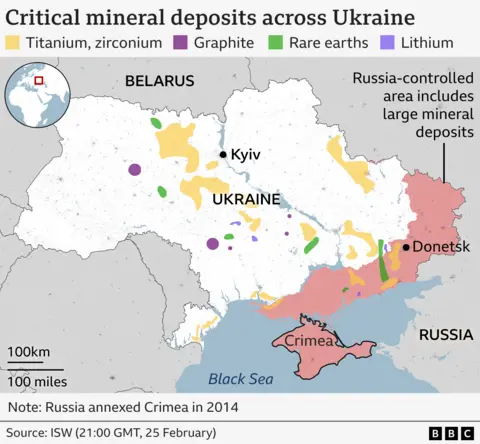Ukraine’s Prime Minister Denys Shmyhal says a major minerals deal with the US has been agreed.
Speaking to Ukrainian TV, Shmyhal said a clause said that the US was “supporting Ukraine’s efforts to obtain security guarantees needed to build lasting peace”.
Media reports say Washington has dropped initial demands for a right to $500bn (£395bn) in potential revenue from the natural resources but has not given firm security guarantees.
US President Donald Trump said he was expecting his Ukrainian counterpart Volodymyr Zelensky in Washington to sign the deal this week, after the two leaders exchanged strong words about each other.
Without confirming that an agreement had been reached, Trump said on Tuesday that in return for the deal Ukraine would get “the right to fight on”.
“They’re very brave,” he told reporters, but “without the United States and its money and its military equipment, this war would have been over in a very short period of time”.
Asked whether supplies of US equipment and ammunition to Ukraine would continue, he said: “Maybe until we have a deal with Russia… We need to have a deal, otherwise it’s going to continue.”
There would be a need for “some form of peacekeeping” in Ukraine following any peace deal, Trump added, but that would need to be “acceptable to everyone”.
Ukraine holds deposits of critical elements and minerals, including lithium and titanium, as well as sizeable coal, gas, oil and uranium deposits – supplies worth billions of dollars.
Shmyhal said the preliminary agreement envisages that an “investment fund” will be set up for Ukraine’s reconstruction. Kyiv and Washington would manage the fund on “equal terms”, the prime minister added.
Against a hostile backdrop where Washington has been seen by allies as aligning with Moscow, it is hoped this agreement will pave the way for more co-operation between Kyiv and its once biggest ally.
Just last week, Trump described Zelensky as a “dictator”, and appeared to blame Ukraine – not Russia – for starting the war, after the Ukrainian leader rejected US demands for $500bn in mineral wealth and suggested that the American president was living in a “disinformation space” created by Russia.
Zelensky argued nowhere near that much American aid had been provided, adding: “I can’t sell our state.”
On Tuesday, Trump said the US had given Ukraine between $300bn and $350bn.
“We want to get that money back,” he said. “We’re helping the country through a very very big problem… but the American taxpayer now is going to get their money back plus.”

Kyiv hopes that a financial stake might give the White House a reason to protect Ukraine if this war was to reignite after a ceasefire was signed.
The White House meanwhile is setting a precedent. US aid in the Trump era comes with strings attached. Aid for aid’s sake – whether given for humanitarian or strategic reasons – is a thing of the past.
That represents a fundamental reordering of American foreign policy for more than 75 years, from the days of the Marshall Plan to post-Cold War idealism and George W Bush’s “Freedom Agenda” push to promote global democracy.
Ukraine is just the start. Expect Trump and his foreign policy team to apply their “America First” principles around the world over the course of the next four years.





